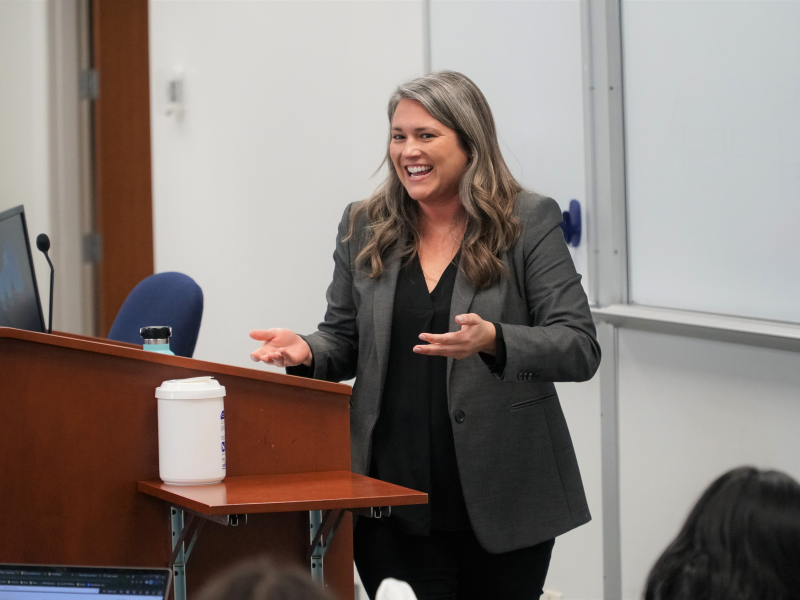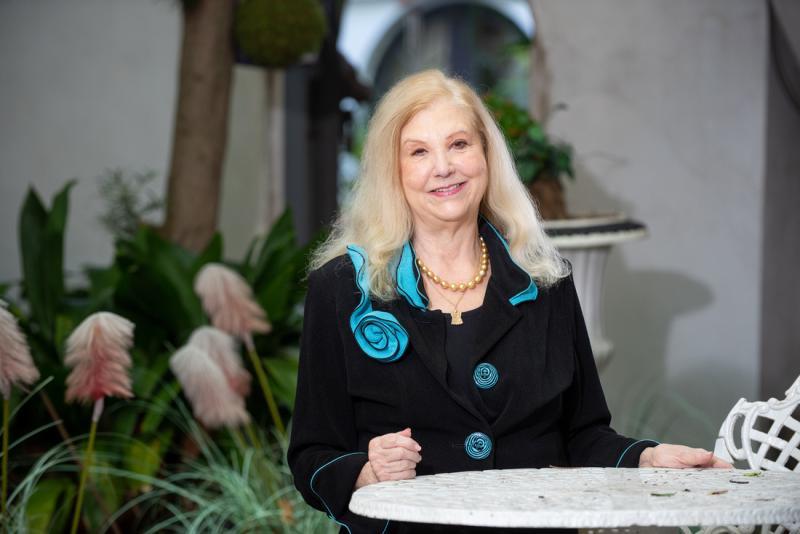Space Law program at Tulane takes launch
law school's Space Law program.
How do you take an emerging legal problem, one where there is almost no case law and is founded on principles so broad, it could be hypothetical at every turn?
That’s the reality of space law – where the commercialization of travel and industry is only beginning to take shape – but where the law can only speculate, use history and the tenets of maritime and aviation law to seek clarity.
“It’s a bit of the wild, wild west,” said Professor Jeanne Amy (L’16) who taught Tulane’s first mini-course in space law in the spring, so popular that a whopping 60 students registered. “There is literally no case law. So we really lean into the international space law treaties and conventions to set the foundation for discussions and analogize to areas of maritime law that might be more familiar to the students.”
Amy’s expertise in space law stems from her work as a trial attorney for the Department of Justice’s Aviation, Space & Admiralty Litigation section. Prior to joining the DOJ, Amy practiced in the Maritime group at Jones Walker in New Orleans. The foundation she set is paving the way for Tulane to continue to build on that course to develop a robust space law curriculum, thanks to the generosity of alumna Darleen Jacobs (L’81) who gave a $1 million gift to launch it, and who strongly believes it’s the future of law.
“It seemed to me to be the next natural advancement in law,” Jacobs said not long after making the gift to Tulane Law. “And I thought about where this gift would make impact, and Tulane was the best choice. I look forward to seeing the program grow.”
The gift created the Judge S. Sanford Levy and Judge Anna Veters Levy Endowed Fund to be used exclusively to develop the space law program at Tulane. Jacobs made the gift in honor of her late husband, S. Sanford Levy, and his first wife, Judge Anna Veters Levy, who graduated from Newcomb College in 1913 and the Graduate School in 1915. Both Levys made significant contributions to the law in Louisiana.
The development of the program continues this fall with two courses, one taught by Amy, and one taught by Professor Wian Erlank, a space law and property law expert from the North-West University in South Africa.
Amy will teach “Space Law: Jurisdiction and International Treaties,” a course that focuses on the five central space law treaties and examines the framework for how to answer questions of jurisdictional authority in outer space.
Erlank’s course,” Space Law: Property, Tort, and the Environment,” builds on Amy’s course by exploring three interrelated areas impacting the future of space law: delict (tort), property, and the environment. In Erlank’s course, students will study how tort law principles will apply in space when injuries occur, as well as how property rights apply in space with regards to both existing man-made objects, like satellites and spacecraft, as well as celestial bodies. The course finishes by exploring environmental consequences relating to space activity, including environmental issues on Earth due to pollution created during launch operations, objects falling into Earth’s atmosphere and importing new microbes onto Earth due to space activity, and environmental issues caused in space from space debris, space stations, and more.
“What makes Tulane so well-situated to become a leader in space law is our second-to-none expertise in admiralty law, international law, and comparative law,” said Interim Dean Sally Richardson, herself an expert in comparative property law. “Space is the next great commons and, much like the high seas, the law will turn to how all nations work in a global context to manage and regulate other commons to determine how space is governed in the future.”
Amy agrees with Richardson’s assessment of where the future of space law is headed.
“We’re essentially dealing with international treaties and customary norms,” said Amy. “How do we normally address these types of issues? It’s really just a matter of time before disputes emerge that will test how we manage these issues in the future.”
While throughout much of the latter half of the 1900s space was considered mostly a scientific pursuit, it has become an increasingly commercialization effort. The law must catch up to growing technologies and address everything from international cooperation, space debris, common resources, dispute resolution, liability, property rights, and national security – the types of topics Tulane is teaching through its space law courses.
Amy said she can envision so many avenues to space law, including property law, intellectual property, regulation, dispute resolution, environmental law, and military and national security, all within the context of space exploration and exploitation.
Students who took the first space law course offered last spring said they enjoyed the class, largely because it was so different from other law school coursework, which is heavily focused on using cases of past events as a teaching tool.
“We were in a unique position as the first class,” said Cassie Hemmer (L’24). “It was presented in such a way that was helpful to understand the implementation, conceptually and theoretically, of how the law might be applied. It also was conversation-based and that allowed students to tailor it to their unique interests.”
Hemmer is working this summer at DOJ's Aviation, Space & Admiralty Litigation section, and the course was a great foundation for that work.
Recent graduate Andrew Wondolowski jumped at the chance to take Amy’s course in the spring because “it’s truly the next frontier.” Given that his concentration in law school was maritime law, Wondolowski wanted to explore the connection between space and admiralty.
And, as a military veteran, he said he often spoke with Amy after class about issues of defense and national security that he thought were so relevant in connection with space. And what space travel and exploration will lead to also interested him.
“I saw the opportunity to get in on the ground floor of an important area of transportation law,” said Wondolowski, who is heading to work in the field at the New Orleans firm of Pusateri, Johnston, Guillot and Greenbaum. “How we use space has become so important in the past 60 years, and yet, we have very little law to guide us."
In the fall, in conjunction with its two space law courses, the law school will host a two-hour event to officially launch the program. The event will take place Sept. 14 at 5 p.m. in the Wendell H. Gauthier Moot Court Room 110 of the law school, 6329 Freret St.
Professors Amy and Erlank will be joined in the public presentation on space law by Dr. Danielle Carroll of the Space Surgery Association.
Carroll served as a Captain in the U.S. Air Force before attending the University of Virginia Medical School. She attended an intensive program at the Johnson Space Center in Houston to learn about space health and did a fellowship in Space Health Innovation at the University of California-San Francisco.
Carroll will speak on issues of health care and space, while Erlank will focus on environmental issues and space exploration, and Amy will discuss framing issues for the first cases involving the United States relating to space. The program is open to the public.
A reception will follow in the Marian Mayer Berkett Multipurpose Room.


